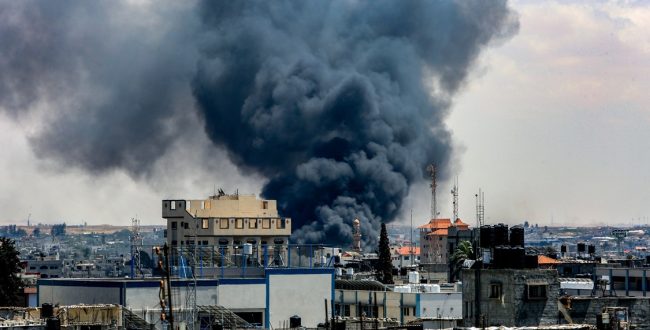The Hamas attack on October 7th highlighted the failure of Israel’s security strategy and its implementation. This document aims to illustrate the extent of this failure and propose principles for an alternative security framework. By extension, this document also challenges the notion that only senior military officials possess the requisite expertise to reshape security conceptions, thereby questioning their monopoly in this domain.
The collapse of the current security framework last October is not an isolated incident in the state’s history. In Israel, such failures are often attributed to individual, tactical errors: if only field intelligence warnings had been heeded, if only the Air Force had launched a preemptive strike, outcomes would differ. Yet, should not a series of failures indicate a deeper, more structural problem?
The Principles of a Superiority-based Security Conception
According to this conception, Israel is inherently foreign to its surrounding region and will never integrate in it. Ehud Barak famously described it as a ‘villa in the jungle’. Israel perceives itself under constant existential threat, and having been attacked in the past, it believes that no political resolution can guarantee its future safety. This conception, though tempered by peace treaties with Egypt, Jordan, and more recently with some Gulf states, persists within the Israeli establishment. Consequently, Israel must maintain military superiority over any potential Arab military or Arab coalition.
Only Israel can defend itself. Distrustful of other powers, however friendly, Israel is unwilling to entrust its security in the hands of others. This principle, central to the pioneering of Zionism dictates that the role of other countries is to support Israel’s efforts of self-defense. This principle’s tenacity was evident when Western and Arab allies shielded Israel from an Iranian missile attack, preventing potentially enormous damage.
Israel’s security interests tend to focus on regimes and not their general populace, which it views as hostile. Thus, Israel protects pro-Western Arab regimes that cooperate with it against both domestic dissent and common external enemies.
In the Palestinian context, Israel asserts the need to control Palestinian territory and population from the river to the sea, given the perceived unreliability of Palestinians who may seek retaliation and the liberation of all of Palestine. Palestinian security forces are deemed incapable or unwilling to prevent such actions. Therefore, as part of any permanent resolution, Palestinians must not establish a military force but only a policing force subject to close Israeli scrutiny, adhering to norms set by Israel. Historically, Israeli approval was required for the training and achievements of Palestinian security forces by British and American trainers. Additionally, Palestine’s airspace must remain under Israeli control, as it is today.
Israel’s complete control over the territory and the Palestinian population not only failed to prevent the Hamas attack but rather provoked it, similarly provoking attacks on Israeli soldiers and settlers in the West Bank
Israel insists on controlling the Palestinian electromagnetic sphere, essential for electronic surveillance. Any independent Palestinian state must have a hard border, with Israel controlling border crossings. In a two-state confederation or an open-border policy scenario, Israel will control the external borders of the shared spaces. Settlements and agricultural farms contribute to security by asserting control over Palestinian territory and population.
The Failures of a Superiority-based Security Conception
Security predicated on superiority also prioritizes military considerations over other aspects of Israeli governance, particularly policy and foreign relations. Countries that prevent war through diplomacy and have their security establishments subordinate to their governments are a foreign concept to the Israeli establishment. As a result, Israel misses out on political opportunities to minimize or resolve the conflict, focusing instead on perceived threats and forceful responses to them, rather than political solutions.
Conflict is not a law of nature; we can assume that the resort to force meant that diplomatic avenues were previously rejected. For years, Israeli society has been deeply invested in superiority-based security, socially, emotionally, and economically, thereby perpetuating the conflict. It is crucial to separate security from other areas of life and governance, limiting the security mindset’s pervasive influence.
Reflecting on the past, superiority-based security contributed to shaping the Oslo Accords in a manner that doomed them to failure. The government’s retention and expansion of settlements, alongside the stark contrast between Palestinian demands for full sovereignty and Israel’s security-based superiority, led to promising an autonomy that was never fully realized.
On October 7th, 2023, but also fifty years earlier on October 6th, 1973, the superiority-based security paradigm collapsed. This approach also faltered during the First Intifada in 1987 and other occasions when Palestinians conducted deadly attacks against Israelis, undeterred by the threat of immediate execution. The wall between Israel and Gaza did not prevent the October 7th attack, and sophisticated warning systems were easily neutralized by simple weapons. Israel’s hermetic control over Gaza since 2002, including the blockade since 2007, not only failed to prevent the Hamas attack but rather provoked it, similarly provoking attacks on Israeli soldiers and settlers in the West Bank. The use of force and supremacy has only humiliated Palestinians and provoked counter-violence. Unrestrained violence in Gaza will not secure Israel; only a political resolution opposed to power exertion and supremacy will.
Three Iterations of Supremacy
Three iterations of superiority-based security currently dominate Israeli discourse. The first is the approach of the old-school security establishment which underpinned the Oslo Accords and shaped Israel’s stance in the peace process. Center and Left-wing parties, including Israeli peace organizations associated with them, proposed political arrangements based on proven security superiority, even at the cost of undermining Palestinian sovereignty.
The second iteration, espoused by Netanyahu, involves perpetual ‘living on the sword’ with Palestinians, Iranians, and Hezbollah, while maintaining a sword on standby with remaining Arab states, even those whom Israel now has peace agreements with.
The third iteration, rooted in Religious Zionism, views Palestinians as an existential, even theological enemy undeserving of autonomy. The “Decisive Plan” by Betzalel Smotrich and the far-Right presents Palestinians with the choice between eternal subjugation or expulsion. During the 2023 war, the military already partially acted on this plan. The old-school establishment aligns with the first version, while the emerging security elite, increasingly hailing from Religious Zionism, is divided between the latter two.
Israelis and Palestinians have national, historical, and religious ties to the entire land, but these do not have to be mediated by state sovereignty. Neither side will be expected to change their national narratives and textbooks as a precondition for the other side’s security
Preliminary Principles for Partnership-based Security
Partnership enhances security just as inequality and superiority foster dissent and rebellion. Israel’s security parameters must not compromise Palestine’s sovereignty unless the compromise is mutual. If Israel should monitor Palestine, it can do so from within its own territory (observation balloons, for example) using only international as well as mutually accepted methods (vis-à-vis diplomatic channels, and cooperation of intelligence services.)
Settlers and settlements that remain in Palestine will be subject to Palestinian sovereignty and its laws, and not treated as Israeli enclaves. If an open borders policy is agreed upon, the supervision of the border crossings will be in the hands of both parties, without one side dominating the other. So too with police and detective work. The reality on the ground as well as the interests of both sides show that Jerusalem cannot thrive with a hard border that would prevent the large, natural flow of people and goods between the Palestinian capital and the Israeli one and vice versa. If one party wishes to use advanced surveillance technologies, they shall be available to the other side too. Airspace oversight between the river and the sea should be jointly managed.
During the transition to a professional Palestinian security force, an international force must be instituted to protect Palestine from Israeli aggression and supremacy. Security arrangements should not dictate economic arrangements. Israelis and Palestinians have national, historical, and religious ties to the entire land, but these do not have to be mediated by state sovereignty. Neither side will be expected to change their national narratives and textbooks as a precondition for the other side’s security. If so willing, the parties can make such changes with mutual agreement. Both parties must cooperate to address opposition from those seeking to undermine the agreement.

















